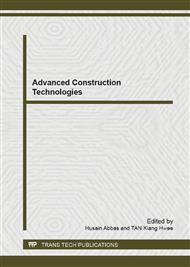p.1047
p.1055
p.1063
p.1075
p.1079
p.1085
p.1091
p.1096
p.1100
Analysis on the Impact of the Type and Content of SBS on the Performance of the Modified Asphalt Mixture
Abstract:
The types and contents of styrene-butadiene-styrene (SBS) modifier are two important factors of SBS modified asphalt mixtures. Nowadays, SBS are extensively utilized to modified asphalt in order to improve the performance of the flexible pavement. The objective of this study is to determine a best selection of types and contents of SBS modifier, which can improve high-temperature stability; low-temperature anti-cracking performance and moisture susceptibility of SBS modified asphalt mixture. The mixtures with four types of SBS (Linear A, Linear B, Star A, Star B) and the different contents of each type SBS including Linear SBS of 0%, 3%, 4%, 4.5% and Star SBS of 0%, 3%, 3.5%, 4%, were evaluated for the pavement performance of them under laboratory conditions. Wheel tracking test, beam bending test and freeze-thaw tensile strength test were chosen and carried out to determine high-temperature stability, low-temperature anti-cracking performance and the moisture susceptibility respectively. The laboratory testing results indicate that Star SBS show the more effective effects than Linear SBS to improve the high-temperature stability, low-temperature anti-cracking performance and moisture susceptibility of SBS modified asphalt mixture, and the optimum content of SBS can also play a key role the improvement of the pavement performance.
Info:
Periodical:
Pages:
1079-1084
Citation:
Online since:
April 2014
Authors:
Price:
Сopyright:
© 2014 Trans Tech Publications Ltd. All Rights Reserved
Share:
Citation:


